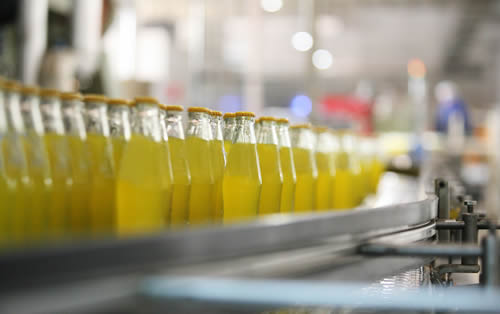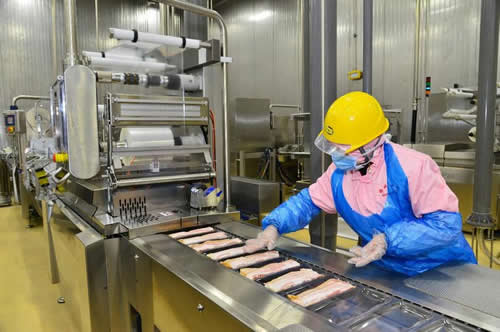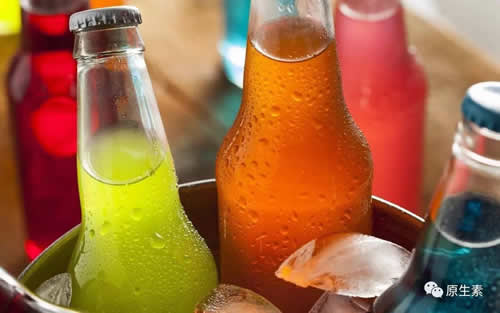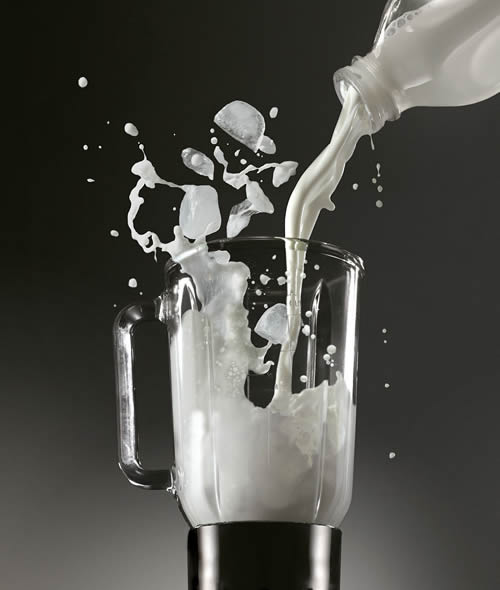ClO2 for Food & Beverage Processing

Food processing industry its production processes are prone to microbial contamination due to continual contact with foreign surfaces and water in several cases.Hence, it is very important to choose a suitable disinfectant which effectively addresses the sanitation challenges in foof plants. Poor sanitation of food contact surfaces has been a contributing factor to outbreaks of food borne diseases. These outbreaks are caused by pathogens in food, especially Listeria monocytogenes, Escherichia coli or Staphylococcus aureus. Inadequate sanitation of surfaces facilitates rapid soil building, which in the presence of water shapes an ideal precondition for bacterial biofilm forming. Biofilm is considered to pose a significant health risk in the dairy industry because it can harbor pathogens, and direct contact with them can lead to food contamination.
Why ClO2 is the best disinfectant for Food & Beverage Processing

ClO2 molecule remains a true gas in solution making it more energetic and able to reach all points in a system. Because it is a true gas and soluble in virtually anything, it can penetrate the bacterial slime layers (biofilm). Then Clo2 will not influence the taste of the food and beverage processed. And also chlorine dioxide breaks down to sodium chloride. This along with the failure to form toxic and carcinogenic chlorination by-products and produce a build-up of toxic organic or inorganic by-products like bromates makes chlorine dioxide the most eco-friendly biocide that can be used.

ClO2 provides excellent microbiological control in flume waters, packaging operations and process disinfection.
Due to its broad-spectrum anti-microbial activity and versatility, chlorine dioxide is the ideal biocide for every bio-security programme. ClO2 kills against a wide range of microorganisms over shorter periods of contact time. This product minimizes corrosion to processing equipment, tanks, lines, etc., as it is a true dissolved gas in water when compared to chlorine.ClO2 products have become more widely used in the food industry, predominantly in the sanitizing of hard surfaces of equipment, floor drains, and other areas to greatly reduce the microbial load in these areas.
ClO2 does not know the limitations and side-effects forthcoming from the use of traditional chemical sanitizers (such as chlorine, iodine and quaternary ammonium compounds) like pH dependency, corrosion, objectionable odor and limited effectiveness against certain pathogens.
ClO2 Application Areas In Food&Beverage Processing

§ Disinfection of process water.
§ Disinfection in seafood, meat and other foods processing.
§ Fruits & vegetable washing.
§ Application in dairy products, beer and winery and other beverage processin
§ Disinfection of plants and processing equipment
§ Disinfection of operators

Food processing industry its production processes are prone to microbial contamination due to continual contact with foreign surfaces and water in several cases.Hence, it is very important to choose a suitable disinfectant which effectively addresses the sanitation challenges in foof plants. Poor sanitation of food contact surfaces has been a contributing factor to outbreaks of food borne diseases. These outbreaks are caused by pathogens in food, especially Listeria monocytogenes, Escherichia coli or Staphylococcus aureus. Inadequate sanitation of surfaces facilitates rapid soil building, which in the presence of water shapes an ideal precondition for bacterial biofilm forming. Biofilm is considered to pose a significant health risk in the dairy industry because it can harbor pathogens, and direct contact with them can lead to food contamination.
Why ClO2 is the best disinfectant for Food & Beverage Processing

ClO2 molecule remains a true gas in solution making it more energetic and able to reach all points in a system. Because it is a true gas and soluble in virtually anything, it can penetrate the bacterial slime layers (biofilm). Then Clo2 will not influence the taste of the food and beverage processed. And also chlorine dioxide breaks down to sodium chloride. This along with the failure to form toxic and carcinogenic chlorination by-products and produce a build-up of toxic organic or inorganic by-products like bromates makes chlorine dioxide the most eco-friendly biocide that can be used.

ClO2 provides excellent microbiological control in flume waters, packaging operations and process disinfection.
Due to its broad-spectrum anti-microbial activity and versatility, chlorine dioxide is the ideal biocide for every bio-security programme. ClO2 kills against a wide range of microorganisms over shorter periods of contact time. This product minimizes corrosion to processing equipment, tanks, lines, etc., as it is a true dissolved gas in water when compared to chlorine.ClO2 products have become more widely used in the food industry, predominantly in the sanitizing of hard surfaces of equipment, floor drains, and other areas to greatly reduce the microbial load in these areas.
ClO2 does not know the limitations and side-effects forthcoming from the use of traditional chemical sanitizers (such as chlorine, iodine and quaternary ammonium compounds) like pH dependency, corrosion, objectionable odor and limited effectiveness against certain pathogens.
ClO2 Application Areas In Food&Beverage Processing

§ Disinfection of process water.
§ Disinfection in seafood, meat and other foods processing.
§ Fruits & vegetable washing.
§ Application in dairy products, beer and winery and other beverage processin
§ Disinfection of plants and processing equipment
§ Disinfection of operators
